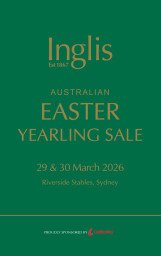4th Feb 2010

Stallions - Graeme Kelly - Wednesday, 3 February 2010
There have been suggestions that an Australia-wide industry tax of five per cent be placed on stallion fees. Is that a viable proposition and, if so, where should the funds accumulated from such a scheme be directed? Stallions Graeme Kelly sourced industry opinion on this subject.
Thoroughbred Breeders Australia president Trevor Lobb:
"THE recent call in some quarters for a five per cent levy on stallion fees to make the breeding industry pay its way in racing is as misdirected as it is ill-defined. Breeders already make a massive contribution to racing. Consider the facts:
"The Australian Stud Book estimates that 60% of breeders own racehorses. TBA has commenced a research project to quantify the actual number of racehorses owned by breeders, but already we have identified that breeders make up the top five owners in this country with 760 racehorses in training. That in itself represents $24m a year in training fees.
"A recent Boston Consulting report identified the breeding industry as the second biggest investor in racing, after Tabcorp. There are literally billions of dollars invested in capital by breeders creating approximately 20,000 jobs, often in hard-pressed rural communities. Breeders contribute more than $4m annually to owners through BOBS, Super VOBIS, QTIS 600 and other state-based incentive schemes - an immensely valuable boost to owners in an era of prizemoney stagnation.
"A great number of studs sponsor races and feature race days resulting in a contribution of in excess of $2m per year. Anyone who tells you this is out of self-interest has never met one of our marketing managers, who deplore such untargeted promotion at the expense of the focused and individualised marketing strategies normally employed by the studs.
"Major studs and the sales companies spend $1m each year subsidising Channel Nine’s broadcasts of the major carnivals in the interest of promoting racing to a wider audience. This is wholly a service to racing as evidenced by the fact that no one would associate Nine’s coverage with breeders for a moment.
"Those who think breeders are a soft target for attack on the funding of racing issue have done us an enormous service. We have, until now, thought our contribution to racing was self evident - apparently not. We are therefore collating all the necessary data to quantify our financial contribution to answer the critics, whether they be well motivated or not. We don’t intend in future to allow our contribution to racing to be overlooked or misrepresented. The future of racing depends on all sectors making a fair contribution commensurate with their role and size. The breeding industry demonstrably pays its way - and then some. That can’t be said of the corporate bookmakers on whom the focus of this debate must remain, however convenient it is for them to divert the attention to others."
Michael Ford, Keeper of the Australian Stud Book:
"I UNDERSTAND that this suggestion for an industry tax to be placed on stallion service fees has arisen because industry participants in the racing sector believe the breeding sector is the only net winner in this wonderful sport of horseracing. The allure of the perceived income of the top stallions and the proceeds of yearling sales is almost overpowering. Yet these stallions are very few out of the 800 who stand at studs in Australia.
"Why differentiate the sectors? Racing and breeding both belong to the one industry, all contributing in various ways, and all have the potential to receive benefits. More than two-thirds of breeders also own racehorses. Many studs, especially the few that own the top stallions, sponsor races - even whole race days - at the carnival, city, provincial and country level.
"I do not believe such a tax is a viable proposition nor is it appropriate for the Australian Stud Book to collect it. While most advertised service fees are public knowledge, the income earned from a stallion is the confidential business of its owners and the Australian Taxation Office, which is better place to collect it. The Stud Book’s role is to identify thoroughbreds and to ensure the integrity of breeding in Australia."
Arrowfield Stud chairman and industry leader John Messara:
"EVERYONE in racing and breeding takes a risk. No one is assured of a profit. In fact, let’s face it, there is inherent risk in owning or breeding a racehorse because of the intrusion of Mother Nature in the process, and that is why the idea of imposing a five per cent levy on certain stallions smacks of the politics of envy.
"In racing we should welcome success, as we all know it is not easy to achieve. To levy what is in effect, a wealth tax, will only discourage investment at a time when we need all the new investment we can get. In any event, a levy of this kind invariably ends up being passed on. Racing people are the ultimate free marketers, surviving and prospering on the back of their own hard work and business acumen. Breeders are the same. “No-one is suggesting we impose a five per cent tax on the most successful trainers, jockeys, farriers and vets - yet the same case can be made for levying them as for breeders. To single out breeders is inherently unfair. I welcome the success of any industry participant who makes a good living from racing and breeding. Let’s celebrate and admire success in our industry - not tax it.
"The emergence of a champion sire can generate great income for his owners, but often the horse is syndicated and the benefits are shared among many - and, we all know how difficult it is to strike a significant stallion. As for broodmare ownership, the attrition rate generally means that the long term returns there are no better than in any other industry. Furthermore, it should be noted that breeders are the largest racehorse owners in the industry in the country, and in this way make a huge contribution to the sport - by putting on the show.
"So when you see a big yearling price achieved or a service fee apparently going through the roof, remember that if this were not to occur from time to time, breeders would not survive, with serious consequential impacts on the sport overall."
Former interim Thoroughbred Breeders Australia president and Independent Stallions principal Mike Becker:
"THE question of a stallion tax, both on its collection and distribution, is illogical and not well founded. The point has been raised by people with little regard to the history of the subject or an understanding of the possible ramifications of such an added impost.
"The Australian Stud Book looked at this very subject as a revenue raiser some years back with a view to “slugging” the big multinational farms which had large numbers of shuttle stallions. Due to fair trading regulations, the upshot was a massive hike in stallion return fees across the board, which had a huge impact on the smaller farms with cheaper stallions and very little impact on those at which it was aimed. Similarly, a stallion tax as suggested would impact hardest on those who can least afford the additional costs.
"Also, on what point would such a tax be charged? Advertised fee or actual fee received, because we all know there is a huge void in the two? It can be argued that those who can afford any increase in fees are already supporting the racing industry strongly through racehorse ownership and race club promotion, which goes towards prizemoney; but all costs are relative and many of the smaller farms, with cheaper stallions, are equally heavily involved in ownership to some degree as their progeny are unlikely to meet commercial sales criteria.
"In an industry already full of seepage and wastage of money (ie: media costs, offshore betting agencies and so on) this suggestion of a stallion tax is yet another elitist reaction based on the general acceptance that stallion owners all have rivers of expendable income. Also, history dictates that any such revenue would not be wisely spent, probably expensive to administer, and offer up only a marginal nett result."
Vinery Stud general manager Peter Orton:
"I DON’T believe this suggestion is a viable proposition, but granted it would certainly be a significant money-raising exercise. Such fundraising would be disproportionate across the industry, resulting in funds being raised from a selection of breeders (not necessarily just the ‘big breeders’) to benefit the industry as a whole. Furthermore, this is a case of the cart before the horse as there is no plan identifying which state, breeding/racing association or industry body would receive the money raised, nor how or where it would be applied.
"It is generally agreed that the key issue is to maintain and improve prizemoney levels to avoid the constant decline of participants across every level of the industry. Like all businesses, and especially in difficult times such as these, our industry needs to be constantly restructuring, minimising costs, and improving income levels to allow for continued development. There are a number of initiatives already being undertaken such as the club mergers, corporate bookmakers, industry share of betting turnover and so on, and these need to continue. However, we desperately need to become better organised nationally as an industry to efficiently manage our finances and to seek to generate more effective avenues of income. While stallion services would certainly be included, raising such income must be fairly based and structured to be of maximum benefit where it is applied.
"The Stud Book and the Registrar of Racehorses are the central sources of our industry, as they identify and register every breeder and racehorse owner in the country. Any form of levy should be generated from this source to ensure fair and proportionate industry involvement.
"I think it would be wrong if this idea was being put forward purely as a way of obtaining additional monies from the big international operations. While they are certainly powerful competitors for our local farms and difficult for us to compete with, they do bring enormous benefits to our industry."
Blue Gum Farm marketing director Darryl Sherer:
"THIS subject is often brought up and the question I always ask is ‘why?’ All sectors of the industry pay tax, and the argument that stallion owners ‘can afford it’ is fanciful nonsense. One could argue that everyone who derives any form of income from racing and breeding should pay a tax. I don’t see a call for jockeys or trainers to pay a tax of five per cent on their winnings, and nor should they. Is there a suggestion that owners pay a five per cent tax on their horse’s winnings? No!
"Protection of the punter is often extolled in the tabloid press yet I wonder what the response would be if there was a move to deduct five per cent tax from all winnings. It is very easy to look at the handful of stallions generating big service fees, but the biggest gamble of all is taken by studs when they invest in a stallion with no guarantee underpinning those that fail. Most breeders also race horses and stud farms contribute enormously to the national economy - in terms of employment and spending in associated industries. We could go on.
"I think that stallion owners would consider a tax, if all others in the industry did the same. Perhaps those calling for a tax will give up five per cent of their salary as a gesture of solidarity. I think we know the answer to that. Dividing this industry up into categories of who is more important, or who contributes more, is simply divisive and achieves nothing. If everyone could work together on a national basis then the industry would be better off.
"Besides what would the tax go towards? Who would administer it? What is it meant to achieve? These are the questions that need answering."
-thumb.jpg)
8, 9, 10 February 2026
-thumb.jpg)
1, 2, 3 March 2026

29, 30 March 2026

30 January - 4 February 2026

30 January - 4 February 2026

19 April 2026